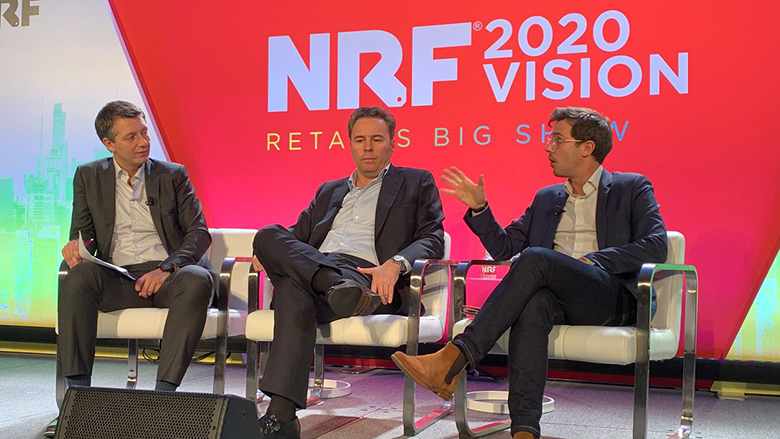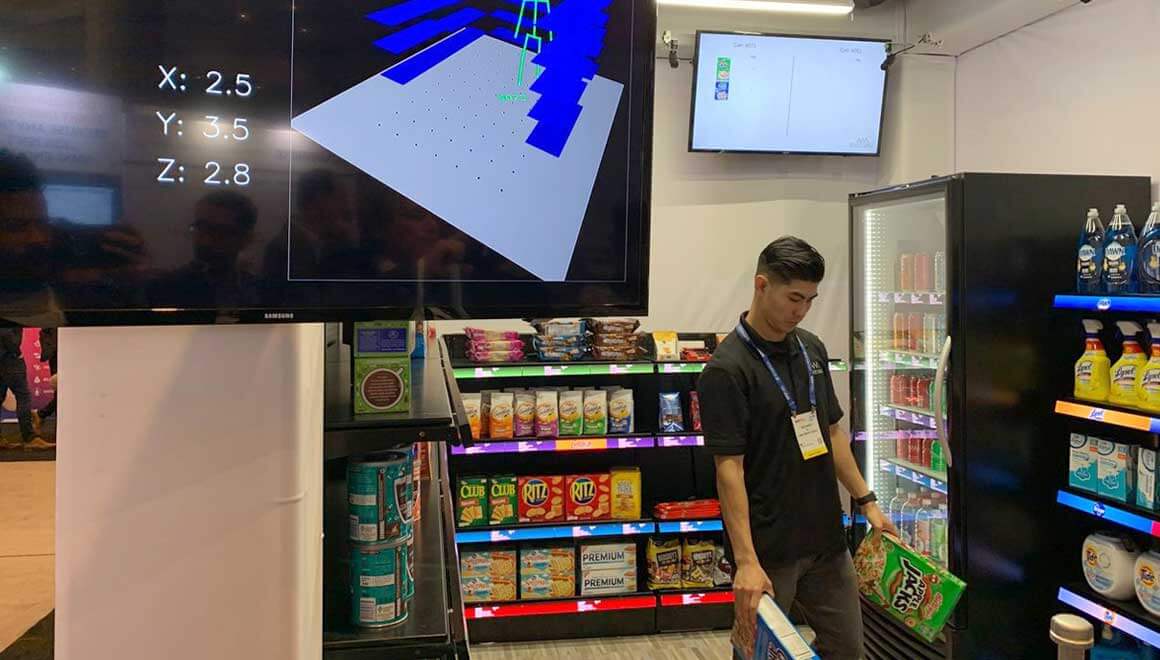Old-guard retailers are looking for technology systems that can make visits to physical stores better or more relevant
By Jared Council Updated Jan. 15, 2020 8:01 am ET
At the National Retail Federation’s 2020 Vision conference this week, startups and established technology vendors touted how they can help traditional retailers keep shoppers spending money in physical stores.

Thomas Andrews, partnership manager at Carrefour SA, right; Dimas Gimeno, chairman at Skintelligence Investments SL, center; and Massimo Volpe, chairman at the Forum for International Retail Associations, spoke at the National Retail Federation show in New York on Tuesday. PHOTO: JARED COUNCIL / THE WALL STREET JOURNAL
Some of the companies at the conference in New York showed off artificial intelligence-powered systems that predict inventory shortages. Others demonstrated robots that can transport items within stores. But a crop of startups displayed technology that helps bring people into physical locations—or enhances experiences while they are there.
French grocery company Carrefour SA is undergoing a digital transformation that involves new back-end systems, as well as customer-facing technology at physical locations. The company said it has a “Flash Store” at its headquarters just outside Paris where it is testing customer facial recognition for payments, among other technologies.
Partnerships, including those with tech providers, are vital for Carrefour’s transformation, said Thomas Andrews, partnership manager at the company. “We are ending the ethos of doing it on our own,” he said.
AWM Smart Shelf is one of a number of startups trying to help traditional retailers improve their stores with technology. The California-based company sells technology systems for self-serve stores without cashiers, in the same vein as Amazon Go. Dubbed AWM Frictionless, the system includes digital shelving and object-recognition cameras that can keep track of which customers leave with which items. Customers have to do facial recognition and mobile device scans when they enter, which allows the system to charge their digital accounts when they leave with items.
But there is a slight twist, said Smart Shelf co-founder Kurtis Van Horn. The company’s technology is able to personalize experiences for shoppers in stores based on what they pick up, even if they don’t buy it. For example, if a customer picks up a box of cereal and puts it back, the retailer can use the system to offer a discount right on the shelf beneath the item the next time the shopper encounters it in the store.
“It is taking the personalization and that customization that you would have by shopping online and applying that to brick and mortar,” Mr. Van Horn said.
One of Smart Shelf’s biggest customers is Mexican convenience store chain OXXO, which uses the startup’s so-called frictionless systems in two of its locations. Smart Shelf also is launching a 1,500-foot cashierless store at an undisclosed university apartment building in California in partnership with a large retailer later this year.
By contrast, French digital signage company Acrelec is piloting a technology platform that helps retailers better manage curbside pickup at stores by customers who place orders online.
When a retailer’s customer indicates that they are coming to pick up an order using that retailer’s smartphone app, store associates can use Acrelec’s system to estimate when customers may arrive at a particular store.
Acrelec’s system uses object-recognition cameras to identify exactly when a customer’s car arrives and where it is parked. The goal is to optimize item retrieval and reduce wait times.
James Harris, a product manager with Acrelec, said the technology is being tested in the U.S. He added that it could improve customer service at big-box retailers, home-improvement stores and grocery stores, and may even prompt shoppers to come inside.
“What we see is, perhaps people would buy bulk goods, have them [placed in their cars], but then they’d go and pick out their own fresh produce and bread in the stores themselves,” he said.
Montreal-based Booxi also is working on helping retailers pull customers into stores. The company launched in 2016 as an online booking platform with a focus on hair stylists and other small businesses, but over the past 18 months it landed some nearly two dozen retail customers, accounting for about 4,000 stores, interested in drawing people inside for events and meetings.
Booxi’s clients include apparel retailers who offer style-consulting appointments as well as pet stores offering tubs and equipment for washing dogs.
Elie Perez, Booxi’s co-founder and chief revenue officer, said physical retail locations aren’t dying, as they still account for the lion’s share of sales transactions for many industries. However, retailers are trying to reimagine how to use stores, including by offering unique experiences.
“When you know what you want, it is easier to buy online,” he said. “But for the rest, you still have a lot of products that you need help to buy. There are a lot of industries where it is very important for people to connect.”


